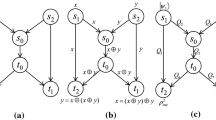Abstract
Secure and faithful transmission of quantum information between remote locations is still a basic topic in quantum communication. Beyond remote state preparation and entanglement distribution by separable states, quantum discord, as a more general quantum communication resource, controls the realization of the whole communication process. In this paper, we propose a feasible quantum network coding scheme utilizing quantum discord resource fully. With the help of entanglement distribution by separable states, the scheme initially achieves quantum entanglement distribution of two crossing source–target pairs in a butterfly network with fewer entanglement resources. Furthermore, by means of remote state preparation, known quantum states can be transmitted across a network via previously shared quantum channels with the assistance of some classical information. Compared with the representative schemes, the proposed scheme is more efficient in the use of quantum resources. The deduced relationship indicates that quantum discord is the necessary resource for quantum network coding based on remote state preparation, particularly, less entanglement corresponds to higher fidelity.



Similar content being viewed by others
Explore related subjects
Discover the latest articles, news and stories from top researchers in related subjects.References
Ahlswede, R., Cai, N., Li, S.Y.R., et al.: Network information flow. IEEE Trans. Inf. Theory 46(4), 1204–1216 (2000)
Hayashi, M., Iwamam, K.: Quantum network coding. Theoretical Aspects of Computer Science, Lecture Notes in Computer Science, vol. 4393, pp. 610–621 (2007)
Hayashi, M.: Prior entanglement between senders enables perfect quantum network coding with modification. Phys. Rev. A 76(4), 538 (2007)
Wang, F., Luo, M.X., Xu, G.: Photonic quantum network transmission assisted by the weak cross-Kerr nonlinearity. Sci. China Phys. Mech. Astron. 61(6), 060312 (2018)
Nguyen, H.V., Babar, Z., Alanis, D.: Towards the quantum Internet: Generalised quantum network coding for large-scale quantum communication networks. IEEE Access 5, 17288–17308 (2017)
Li, D.D., Gao, F., Qin, S.J.: Perfect quantum multiple-unicast network coding protocol. Quantum Inf. Process. 17(1), 13 (2018)
Satoh, T., Gall, F.L., Imai, H.: Quantum network coding for quantum repeaters. Phys. Rev. A 86(3), 1–8 (2012)
Shang, T., Li, K., Liu, J.W.: Continuous-variable quantum network coding for coherent states. Quantum Inf. Process. 20(4), 291 (2017)
Bennett, H.: Teleporting an unknown quantum state via dual classical and Einstein–Podolsky–Rosen channels. Phys. Rev. Lett. 70(13), 1895–1899 (1993)
Pati, A.K.: Minimum classical bit for remote preparation and measurement of a qubit. Phys. Rev. A 63(1), 014302 (2000)
Lo, H.K.: Classical-communication cost in distributed quantum-information processing: a generalization of quantum-communication complexity. Phys. Rev. A 62(1), 012313 (2000)
Devetak, I., Berger, T.: Low-entanglement remote state preparation. Phys. Rev. Lett. 87(19), 197901 (2001)
Berry, D.W., Sanders, B.C.: Optimal remote state preparation. Phys. Rev. Lett. 90(5), 057901 (2003)
Chen, Z.B., Zhang, Y.D.: Possible realization of josephson charge qubits in two coupled bose-einstein condensates. Phys. Rev. A 65(2), 130–132 (2002)
Abeyesinghe, A., Hayden, P.: Generalized remote state preparation: trading cbits, qubits, and ebits in quantum communication. Phys. Rev. A 68(6), 062319 (2003)
Ye, M.Y., Zhang, Y.S., Guo, G.C.: Faithful remote state preparation using finite classical bits and a non-maximally entangled state. Physics 69(2), 577–580 (2003)
Jiang, M., Zhou S., Ding M.X.: Quantum network coding based on remote state preparation of arbitrary two-qubit states. In: Proceedings of the 36th Chinese Control Conference (F). Dalian, China, pp. 9757–9760 (2017)
Dakic, B., Lipp, Y.O., Ma, X., et al.: Quantum discord as resource for remote state preparation. Nat. Phys. 8(9), 666–670 (2012)
Datta, A., Flammia, S.T., Caves, C.M.: Entanglement and the power of one qubit. Phys. Rev. A 72(4), 042316 (2005)
Ollivier, H., Zurek, W.H.: Quantum discord: a measure of the quantumness of correlations. Phys. Rev. Lett. 88(1), 017901 (2001)
Liu, Z.W., Hu, X., Lloyd, S.: Resource destroying maps. Phys. Rev. Lett. 118(6), 060502 (2017)
Streltsov, A.: Quantum correlations beyond entanglement, pp. 11–16. Springer, Cham (2015)
Berta, M., Brandao, F.G., Majenz, C.: Deconstruction and conditional erasure of quantum correlations. Phys. Rev. A 98(4), 042320 (2018)
Cubitt, T.S., Verstraete, F., Dur, W., Cirac, J.I.: Separable states can be used to distribute entanglement. Phys. Rev. Lett. 91(3), 037902 (2003)
Shang, T., Liu, R., Fang C.R., Liu, J.W.: Quantum network coding based on entanglement distribution. In: Proceedings of the 5th International Conference of Artificial Intelligence and Security (ICAIS). New York, USA, pp. 13–24 (2019)
Kay, A.: Using separable bell-diagonal states to distribute entanglement. Phys. Rev. Lett. 109(8), 080503 (2012)
Fedrizzi, A., Zuppardo, M., Gillett, G.G.: Experimental distribution of entanglement with separable carriers. Phys. Rev. Lett. 111(23), 230504 (2013)
Chuan, T.K., Maillard, J., Modi, K., et al.: Quantum discord bounds the amount of distributed entanglement. Phys. Rev. Lett. 109(7), 070501 (2012)
Bennett, C.H., Divincenzo, D.P., Smolin, J.A., Wootters, W.K.: Mixed-state entanglement and quantum error correction. Phys. Rev. A At. Mol. Opt. Phys. 54(5), 3824 (1996)
Duan, L.M., Guo, G.C.: A probabilistic cloning machine for replicating two non-orthogonal states. Phys. Lett. A 243(s5–6), 261–264 (1998)
Bennett, C.H., Hayden, P., Leung, D.W.: Remote preparation of quantum states. IEEE Trans. Inf. Theory 51(1), 56–74 (2005)
Chaves, R., De Melo, F.: Noisy one-way quantum computations: the role of correlations. Phys. Rev. A 84(2), 2079–2082 (2011)
Acknowledgements
This project was supported by the National Natural Science Foundation of China (Nos. 61571024 and 61971021), the National Key Research and Development Program of China (No. 2016YFC1000307) and Aeronautical Science Foundation of China (No. 2018ZC51016).
Author information
Authors and Affiliations
Corresponding author
Additional information
Publisher's Note
Springer Nature remains neutral with regard to jurisdictional claims in published maps and institutional affiliations.
Rights and permissions
About this article
Cite this article
Liu, R., Shang, T. & Liu, Jw. Quantum network coding utilizing quantum discord resource fully. Quantum Inf Process 19, 58 (2020). https://doi.org/10.1007/s11128-019-2558-1
Received:
Accepted:
Published:
DOI: https://doi.org/10.1007/s11128-019-2558-1




